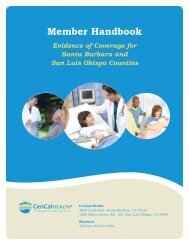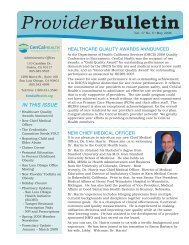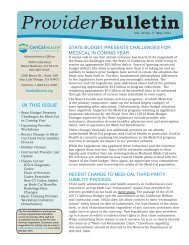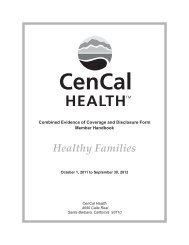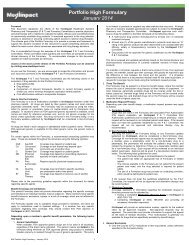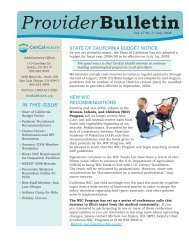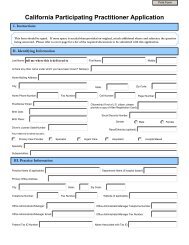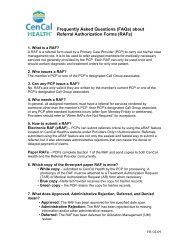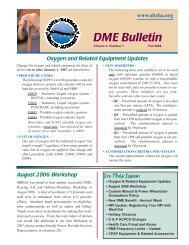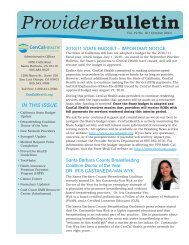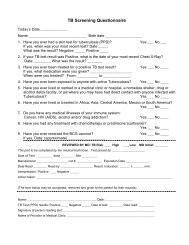Addressing Language Access Issues in Your Practice: A Toolkit for ...
Addressing Language Access Issues in Your Practice: A Toolkit for ...
Addressing Language Access Issues in Your Practice: A Toolkit for ...
You also want an ePaper? Increase the reach of your titles
YUMPU automatically turns print PDFs into web optimized ePapers that Google loves.
33 CALIFORNIA ACADEMY OF FAMILY PHYSICIANS<br />
symptoms turned out to be a fatal case of bacterial men<strong>in</strong>gitis. This hospital ED staff treated and discharged<br />
her, us<strong>in</strong>g one of the patient’s semi-fluent friends as an <strong>in</strong>terpreter. Key symptoms were never <strong>in</strong>terpreted, lead<strong>in</strong>g<br />
to misdiagnosis and the patient’s death. 15<br />
• A 22-year-old non-English-speak<strong>in</strong>g man <strong>in</strong> Miami was awarded a lifetime settlement of $71 million as a result<br />
of a missed stroke. The ED staff assumed his mother's use of the word “<strong>in</strong>toxicado” meant he had a drug<br />
overdose. 16<br />
Policies<br />
Because poor access results <strong>in</strong> poor health, U.S. regulatory agencies have become concerned that a lack of language<br />
access essentially represents a discrim<strong>in</strong>atory practice aga<strong>in</strong>st those whose national orig<strong>in</strong> means they speak a language<br />
other than English. There are a number of laws and regulations, some national and some on the state level,<br />
which may affect your practice <strong>in</strong> this regard. For a more detailed explanation of how these might affect your practice,<br />
consult CMA On Call document #0813, available at www.cmanet.org.<br />
The Americans with Disabilities Act<br />
The Americans with Disabilities Act requires physicians to make “reasonable accommodations” so their practices<br />
are accessible to <strong>in</strong>dividuals with any sort of handicap. Provid<strong>in</strong>g a sign-language <strong>in</strong>terpreter <strong>for</strong> a patient who is<br />
deaf or hard-of-hear<strong>in</strong>g is specifically mentioned as be<strong>in</strong>g a “reasonable accommodation.”<br />
1964 Civil Rights Act<br />
Title VI of the 1964 Civil Rights Act prohibits programs that accept federal fund<strong>in</strong>g from runn<strong>in</strong>g their programs <strong>in</strong><br />
such a way as to create discrim<strong>in</strong>ation on the basis of race, color, or country of national orig<strong>in</strong>. The DHHS Office <strong>for</strong><br />
Civil Rights has <strong>in</strong>terpreted language as be<strong>in</strong>g an aspect of country of national orig<strong>in</strong>. There<strong>for</strong>e, if you accept any<br />
sort of federal fund<strong>in</strong>g (i.e., Medi-Cal), you must provide l<strong>in</strong>guistic access to your services so that LEP patients can<br />
participate <strong>in</strong> your programs <strong>in</strong> the same way that English speakers can. For guidel<strong>in</strong>es from the Office <strong>for</strong> Civil<br />
Rights as to what constitutes compliance with Civil Rights law, see DHHS’ 2002 LEP Guidance Memorandum, at<br />
http://www.healthlaw.org/pubs/200202lepguidance.html (NOTE: This guidance does not apply to physicians<br />
whose practices participate only <strong>in</strong> Medicare Part B and receive no other federal assistance.)<br />
Cali<strong>for</strong>nia Health and Safety Code 9821(c)<br />
This code prohibits recipients of state funds from discrim<strong>in</strong>at<strong>in</strong>g aga<strong>in</strong>st ethnic m<strong>in</strong>orities by “fail<strong>in</strong>g to provide<br />
alternative communication services <strong>for</strong> <strong>in</strong>dividuals who are unable to read, speak or write <strong>in</strong> the English language,<br />
except when the state determ<strong>in</strong>es that such a requirement would place an undue burden on the recipient.”<br />
Cali<strong>for</strong>nia Health and Safety Code 1259<br />
Code 1259 requires acute care hospitals to provide language assistance <strong>in</strong> languages spoken by more than 5% of the<br />
<strong>in</strong>stitution’s patient population. This <strong>in</strong>cludes develop<strong>in</strong>g policies and procedures, provid<strong>in</strong>g <strong>in</strong>terpreter services<br />
24/7, post<strong>in</strong>g notices of <strong>in</strong>terpreter availability, tra<strong>in</strong><strong>in</strong>g staff <strong>in</strong> the availability of <strong>in</strong>terpreters, ma<strong>in</strong>ta<strong>in</strong><strong>in</strong>g a list of<br />
qualified <strong>in</strong>terpreters, track<strong>in</strong>g language preference, and translat<strong>in</strong>g certa<strong>in</strong> <strong>for</strong>ms, as well as other provisions.<br />
Managed Risk Medical Insurance Board (MRMIB)<br />
The Department of Health Services (which oversees Medi-Cal managed care) and MRMIB (which oversees Healthy<br />
Families) both have contract language requir<strong>in</strong>g contracted plans to provide <strong>in</strong>terpretation and translation services<br />
<strong>for</strong> certa<strong>in</strong> threshold populations.<br />
SB853, The Culturally and L<strong>in</strong>guistically Appropriate Services Act<br />
This law, <strong>in</strong>troduced <strong>in</strong>to the state Legislature by State Senator Martha Escutia and passed <strong>in</strong> 2003, requires the<br />
Department of Managed Health Care to adopt regulations ensur<strong>in</strong>g access to language assistance and culturally<br />
competent health care services. The regulations require health care service plans and specialized health care service<br />
plans to implement programs to assess subscriber needs, and to provide translation, <strong>in</strong>terpretation, and culturally<br />
competent medical services. This law also requires a contract between a health care service plan and a physician to<br />
ensure compliance with the standards adopted by the board, as well as requir<strong>in</strong>g a plan to report annually regard<strong>in</strong>g<br />
compliance with the department’s standards.<br />
For complete <strong>in</strong><strong>for</strong>mation on legal requirements to provide l<strong>in</strong>guistic access, see Ensur<strong>in</strong>g L<strong>in</strong>guistic <strong>Access</strong> <strong>in</strong> Health Care Sett<strong>in</strong>gs: Legal<br />
Rights & Responsibilities, published by the National Health Law Project. The document can be ordered at<br />
http://www.healthlaw.org/pubs/2003.l<strong>in</strong>guisticaccess.html.



